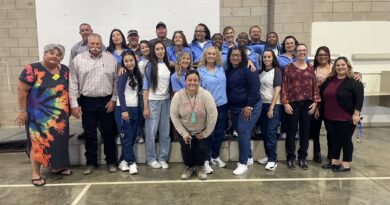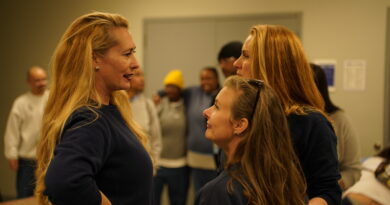Fresno State graduates first women’s cohort
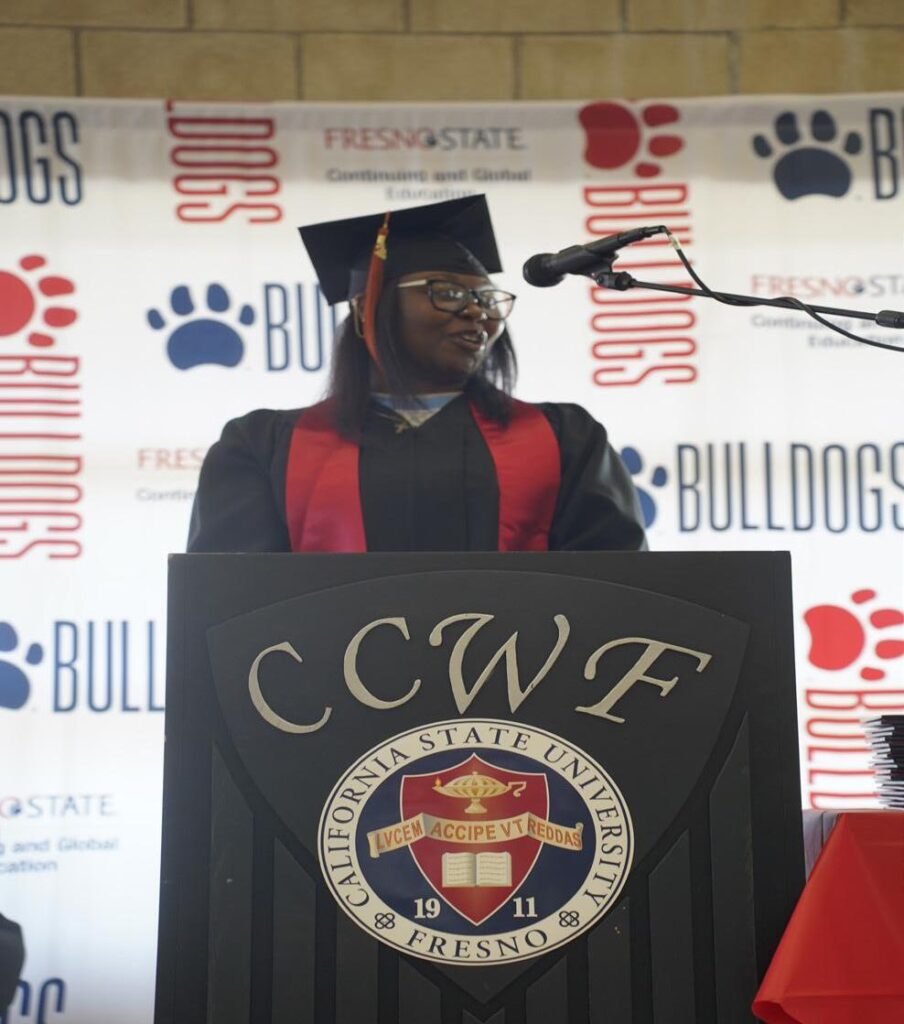
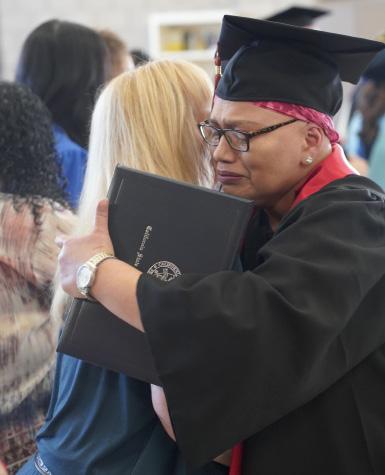
On March 11, 2025, a large crowd gathered at Central California Women’s Facility (CCWF) to honor 20 students — the first people in a California women’s prison to graduate from Degrees of Change, California State University, Fresno’s in-prison bachelor’s program.
The program began in the spring of 2021 during strict COVID-19 restrictions. One of the many obstacles students and faculty faced was the need to separate students by yard and hold classes on Zoom.
For that reason, Degrees of Change was the first program at CCWF that allowed an incarcerated individual to possess a laptop. Most of the participants had never used one before. Students had to navigate this new world of technology while keeping pace with full-time jobs, self-help groups, and workloads of up to four classes each semester.
“Those graduating today are an inspiration,” said Emma Hughes, Degrees of Change coordinator.
Lisa Fore, CCWF college coordinator, echoed the sentiment.
“It’s exciting to see these faces that have come in and out of our door for the past 10 years have this great accomplishment,” Fore said.
“I am truly having a proud parent moment.”
Students expressed similar pride.
“This [bachelor’s degree] was me proving to myself that my past does not dictate my future,” graduate Stacey Dyer said.
The atmosphere was electric with excitement as the graduates waited anxiously for the event to begin. Some graduates stood at the doors to the visiting room, awaiting visitors who came to celebrate their loved ones.
“We are so very proud of our little Jesse,” said Rita Lawson, the grandmother of graduate Jessica Holmes, who came all the way from Sacramento to revel at Holmes’ achievement. Family and friends who could not attend supported their loved ones via Zoom live stream.
Applause and cheers rang out loudly as the familiar “Pomp and Circumstance” emanated from the sound system and the graduates filed into the room.
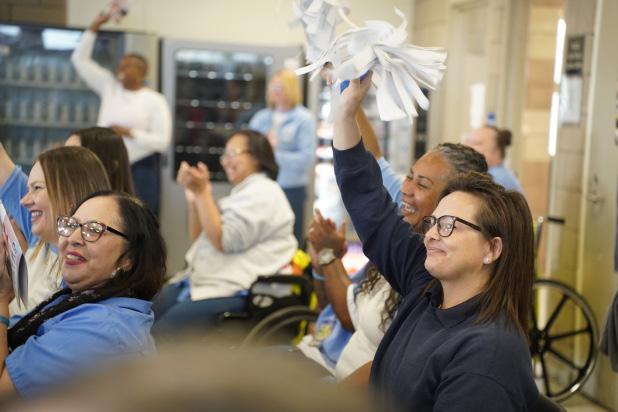
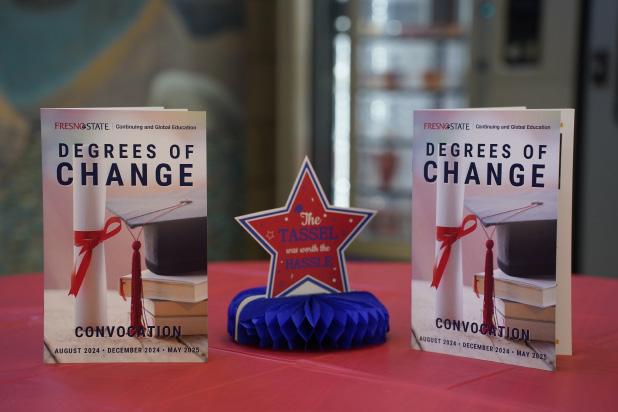
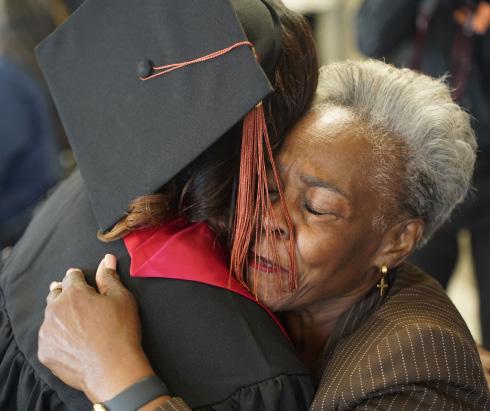
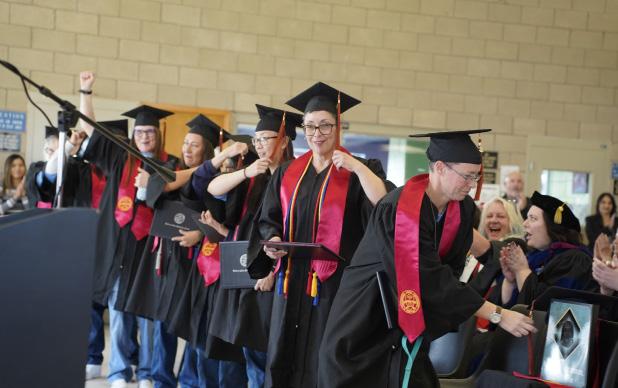
As Hughes began her welcome speech to the crowd, she started by acknowledging La Shanté Ervin. Ervin was a part of the original cohort but passed away before completing the program. In remembrance of her, a chair sat amongst the graduating class that had her photograph, a hat, a tassel, and a graduation gown to signify her honorary place in the program.
Julian Ramos, an extended education specialist at Fresno State, presented a Certificate of Achievement for Ervin that will later be mailed to her family.
CCWF Warden Anissa De La Cruz told the audience, “It’s special for me because I am a Fresno State graduate.”
Two graduates gave speeches reflecting on the hard work and obstacles in their personal lives and within the prison that they all overcame. Eileen Huber and Renecha Gulley brought laughter and tears to the crowd with their words.
“This has been a life-changing journey that I will never forget and am forever honored to have achieved,” Huber said. “I do not stand here alone by any means. I am standing on the shoulders of those who believed in me.”
“No matter where we are, we have to make the best out of life,” Gulley said. “Part of being in the program has allowed us to become a part of something outside of the prison community; it’s been a great experience and an amazing achievement.”
After the presentation of the degrees, Fresno State Provost and Vice President for Academic Affairs Xuanning Fu proudly announced that the ceremony was not official until the graduates moved the tassels from the right side to the left side, signifying graduation.
Graduate Rebecca Braswell paused to transfer the tassel from Ervin’s honorary cap to assure all of the graduates were bestowed the privilege of graduating. Tears and loud cheering erupted at this pivotal moment for the graduates.
The mascot of Fresno State, bulldog Victor E. Bulldog IV, surprised the graduates by visiting with each one and later allowing guests to pet and take photos with him.
Jordan Pickering, associate professor in Fresno State’s Department of Criminology, said, “We know that education reduces recidivism; if part of the goal is to reduce recidivism, then we need more programs like this. It is a true joy for us to teach these students.”

